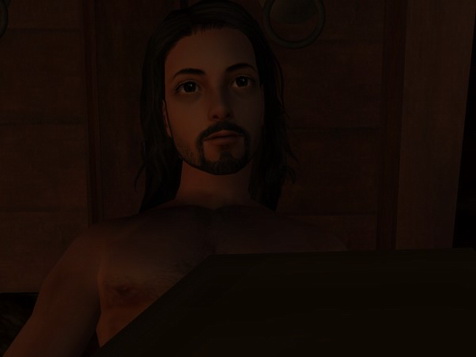
Alred was a poet and a swordsman both. He could tell at a glance the weight and heft of a word and could judge the sharpness of its edge. He could hear the clanging echoes of past strokes in the discordant voices of privately angry men, and he could even measure the menace of words kept sheathed and unspoken.
He might as well have spent his day in the armory as in the bed.

Some had grown wary when he had not joined them in attacking her. Some had grown bold when he had not defended her. The target of every blade or bludgeon was nevertheless the same: Hetty was the villain. He, who had wielded the one true sword in the affair, was the victim.
The one pennant missing from this parade of arms was Hetty’s. She had not come of her own: neither defiantly nor meekly, neither opponent nor penitent. She had thrown down neither a gauntlet nor herself at his feet. She had not come. He had waited all day.
At last he had sent Dunstan to fetch her. She had not come until she had been summoned and escorted like a criminal to the block. He saw she had even knotted up her hair to expose her neck.
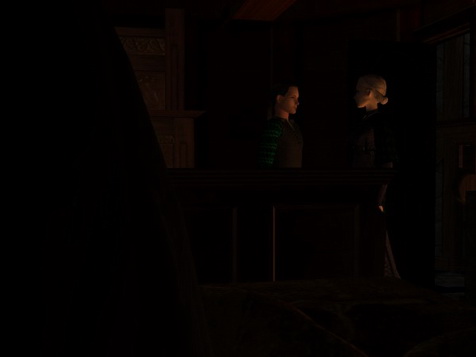
There were those who did not blame her, he knew. There were Leofric’s closest friends, who dared not spatter Leofric by striking her.
He thought there were likely others who enjoyed a tragic romance or who, like Wynflaed, could not too harshly condemn a forbidden love.
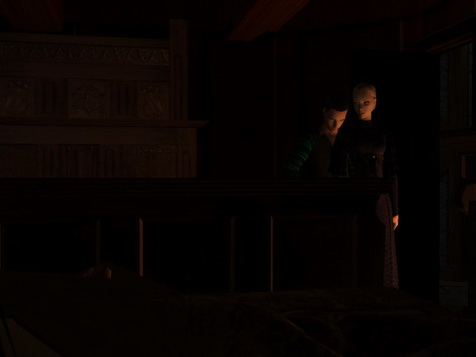
But he did not think there was a man or woman in the valley who forgave Hetty for Hetty’s sake alone. Meek, retiring women such as Hetty did not attract champions. And even had there been one, he or she alone could not have stood against this army.

There was only one man who could save her: one man who could disarm them all with a single stroke and silence them all with a solitary phrase.
Alred had perhaps been the finest English swordsman of his age, and though that age was long past, it was now being said he was the finest English poet of this. He might never swing a sword to much effect again, but he had never wielded words so well.

He let his right hand fall open and empty on the right side of the bed and said with all the ragged voice he had left, “Forgive me, my beauty.”
Hetty turned to him with the unbearably slow grace of a flower turning into the sun, though the firelight behind her only darkened her face.
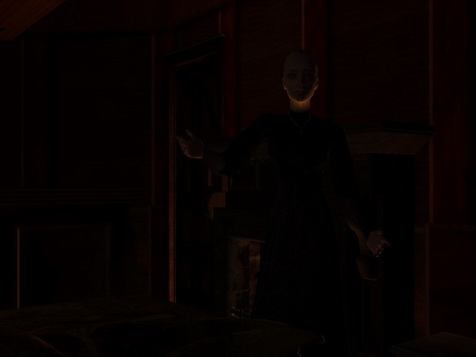
“Alred?” she whispered, seeming as stunned to find him there as he had been to find Matilda.
He patted the bed. “Come close to me, Hetty. I can’t shout.”
She tottered as far as the bedside and bent as far as laying her hand on the bedspread, but she straightened again, jerky and hesitant.
“With you?” she whispered.
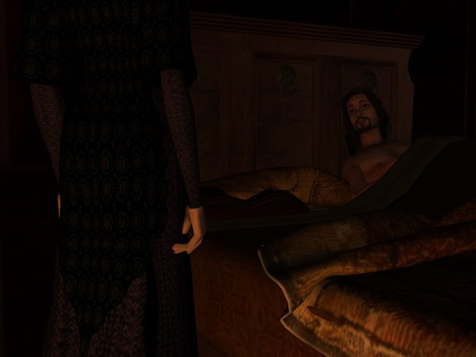
“I cannot rise to greet you as a gentleman ought, I am afraid. Come, Hetty.”
He held up his hand.
She did not take it, but she crept under it, sneaking gingerly onto the bed with eyes averted, and finally snuggling against him low down where she might have hoped he could not see her face.

Hetty was still young, and Alred was the father of six children; he knew well the wiles of a naughty but repentant child sneaking close to steal the affection that she, with her child’s lack of perspective, believes she has lost forever. It told him more than a thousand words.
He let her take her comfort there for a moment before asking again, “Will you forgive me?”
“But, Alred,” she quavered. She lifted her head, and he could almost hear her telling herself she could not permit herself to partake in any tenderness he offered. “I must beg you to forgive me…”
“Now, I asked first,” he scolded gently, “so if you are polite you must forgive me before asking the same favor.”

“But you… but it is my fault,” she squeaked, close to hopeful tears.
“No excuses,” he said as firmly as his creaking voice allowed. “I shan’t make any for myself, so I shall not allow you to make any for me. I did the cruelest, most selfish thing a man with a family can do, and I have asked forgiveness of all of them but you, and had it, too. But I thought you would not forgive me, for you did not come.”
“But I thought… you would not want me…”
“Ah, my dear, that seems to be a common mistake of yours. I would have thought you had learned your lesson last Sunday, but perhaps I must simply say it with words: I want you. I love you. Now – do you believe it?”
She sniffled, smiled, and nodded.
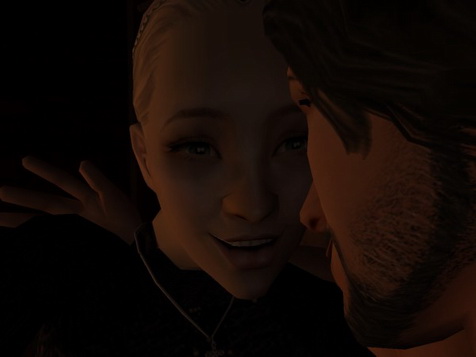
He knew she believed because she longed to believe. She longed to be forgiven. She longed to be loved. Nevertheless, like a child, she seemed to have perversely exaggerated her one proof to the contrary. Like a child, she seemed to have wanted to make him sorry, and like a child, she had run away. Like a child, she had found the outside strange and cold and come wandering home. That he could understand, and that he could forgive.
But there was one last thing he had to know. He took her head in his right hand and brought her face close enough to kiss.

With his left he explored her slowly from head to hip: face and neck, the shawl knotted over her breasts and the breasts beneath, the waist that was thick with the child he had put into her, and down as far as he could reach without bending his aching side, down to the soft handful of her thigh.
She was warm and solid, and more importantly so was he. His body still shivered and ached and throbbed in all the right ways at this contact with hers. He was most definitely alive.
He had tried to kill his body. It was his heart that had died.
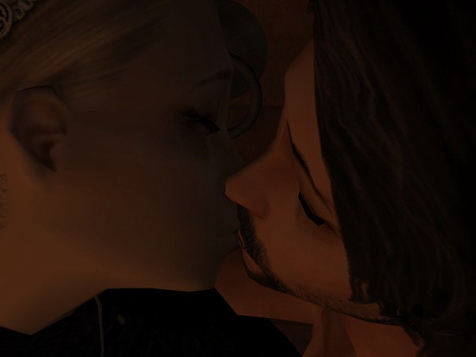






Well, I think that was a good post....in that Alred is asking for forgiveness from Hetty, which is probably the only way to bring her out of her hole she threw herself into. But I'm not sure if Alred is completely ok. That last bit threw me off. How his heart was the one that died. Will he never be able to love Hetty again? Even though he said he loved her? Or does he now just love her like a child....which is a little weird since his body still reacts to her. Or is it just Alred being poetic? All I know is that at least the others will back down now that Alred has forgiven her, and that's what counts. He's right that people such as Hetty don't attract champions. But at least he's willing to be hers and hopefully she'll never have the desire to wander outside again.